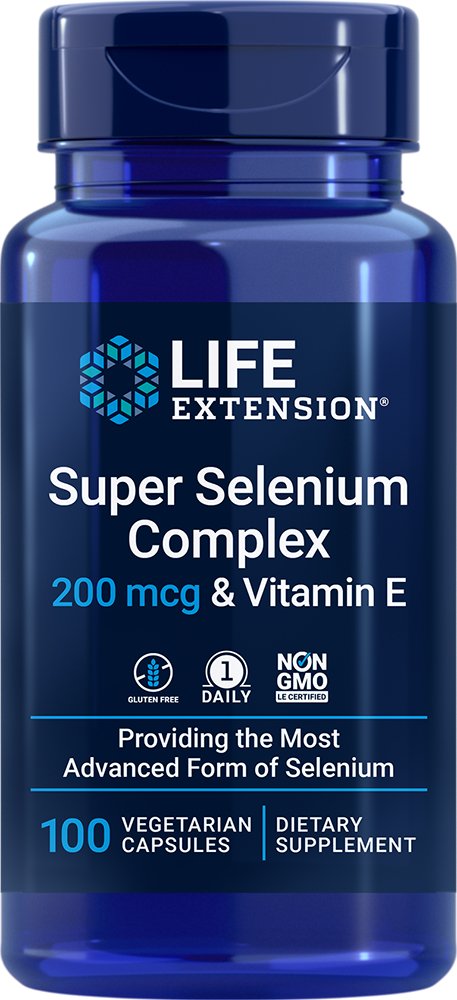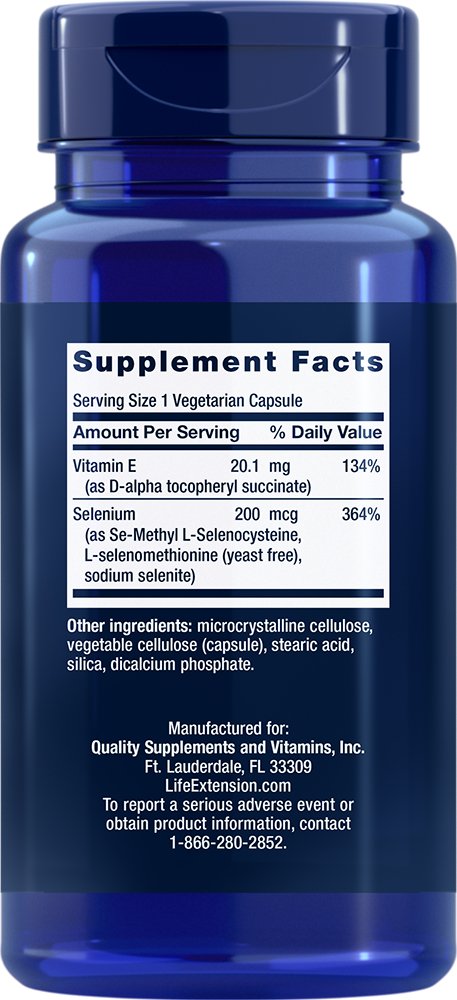Super Selenium Complex (200 mcg, 100 vegetarian capsules)
Super Selenium Complex (200 mcg, 100 vegetarian capsules) Black is backordered and will ship as soon as it is back in stock.
Life Extensions Super Selenium Complex (100 capsules)
Life Extension's Super Selenium Complex has been developed to provide an optimal supply of the essential trace element selenium, which is required for several important processes in the body. Selenium plays a central role in the maintenance of the heart, brain, thyroid and general cellular health, and is known for its antioxidant function that protects against oxidative damage, a major cause of premature aging. This product combines three different forms of selenium (sodium selenite, L-selenomethionine and selenium-methyl L-selenocysteine) to ensure maximum absorption and biological effect. In addition, Super Selenium Complex contains a small amount of vitamin E, which works synergistically with selenium to optimize its health effects.
Health benefits of selenium
Selenium is involved in a number of essential biochemical processes. It is a key ingredient in several enzymes, including glutathione peroxidase, which protects cells from oxidative stress by neutralizing free radicals. Selenium also contributes to the normal function of the thyroid gland by supporting the production of thyroid hormones, which are crucial for the body's metabolism. Furthermore, selenium plays an important role in the immune system, as it supports white blood cells and contributes to a healthy inflammatory response.
Selenium is also known to support cardiovascular health. Research suggests that selenium can help reduce the risk of oxidative stress in the cardiovascular system, thereby protecting against damage that can lead to a heart attack or stroke. Studies have also looked at how selenium can help promote healthy cell division and protect against cancer-causing processes, particularly by neutralizing free radicals that can damage DNA.
In countries such as Norway and Finland, where the soil is poor in selenium, supplements can be important to ensure sufficient intake. Life Extension's Super Selenium Complex provides a balanced supply of the three forms of selenium that help maintain optimal levels in the body.
Super Selenium Complex: Key Benefits
- Antioxidant protection: Protects against free radicals and oxidative stress that can lead to premature aging and cell damage.
- Supports thyroid function: Contributes to the production of thyroid hormones, which are important for the body's energy balance and metabolism.
- Promotes healthy cell division: Helps neutralize free radicals that can damage cells, and plays a role in cancer prevention.
- Cardiovascular health: Contributes to protecting the heart and blood vessels against oxidative stress and inflammation.
- Immune defense: Supports the body's ability to fight infections and diseases by strengthening immune function.
Content per capsule
- Vitamin E (as D-alpha tocopheryl succinate): 20.1 mg
- Selenium (as a mixture of L-selenomethionine, sodium selenite and Se-methyl L-selenocysteine): 200 µg
- Other ingredients: microcrystalline cellulose, vegetable cellulose (capsule), stearic acid, silicon, dicalcium phosphate.
Instructions for use
The recommended dosage is one capsule daily, preferably with a meal, unless otherwise recommended by a healthcare professional. It is important to stick to the recommended dose, as large amounts of selenium can be toxic.
Warnings
Large intakes of selenium can be toxic. Therefore, stick to the recommended dosage. Keep out of the reach of children.
Reservation
Allowed to be used by adults over 18 years of age. All grants are taken at your own risk. The recommended daily dose should not be exceeded. Dietary supplements should not replace a varied diet. We do not claim that the product can cure disease. Keep out of the reach of children.








